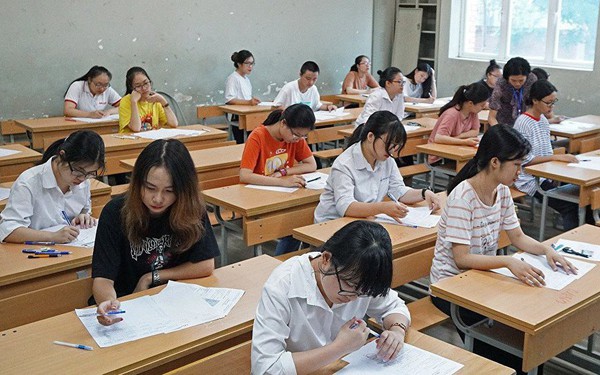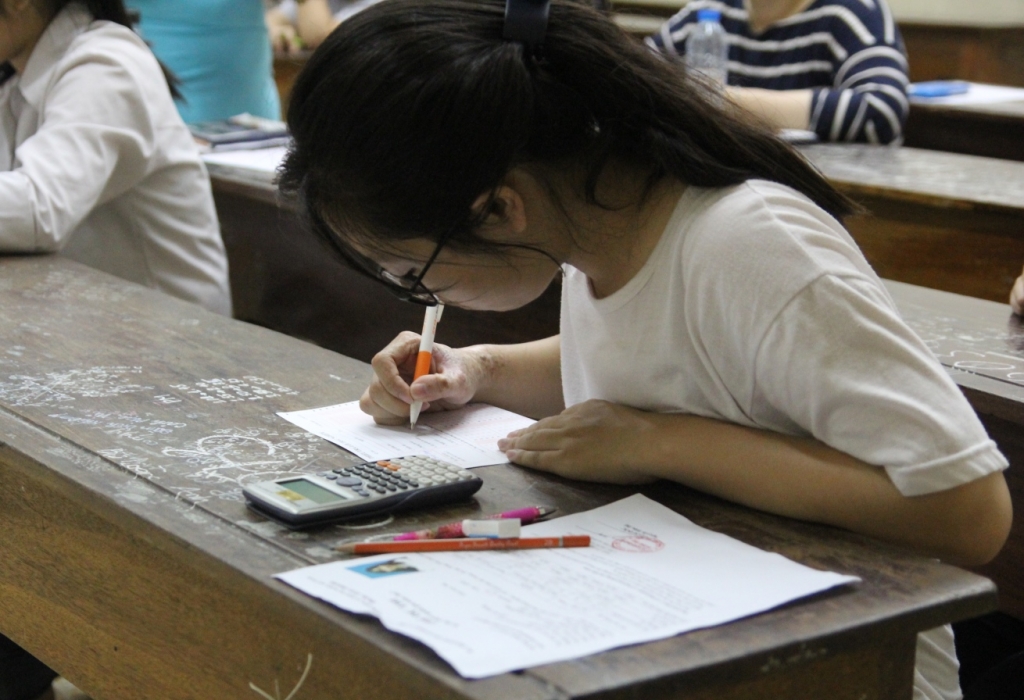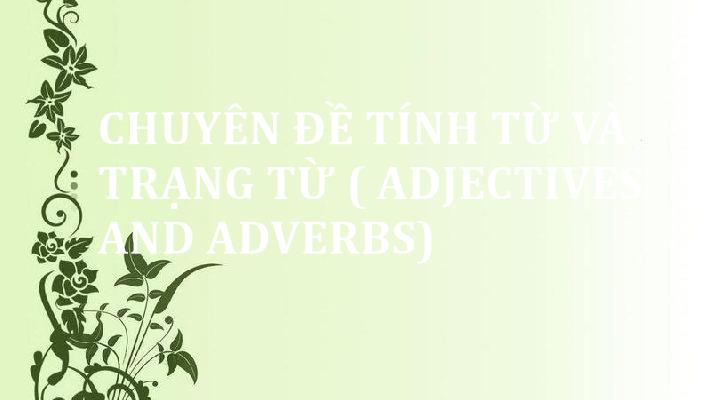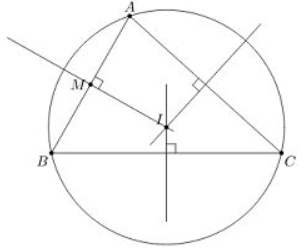Link download: đang cập nhật
PRESENT TENSES - CÁC THÌ HIỆN TẠI
I. Present Simple - Thì hiện tại đơn.
1. Form.
|
(+) |
S + V/Vs/es + O. |
|
(–) |
S + don’t/doesn’t + V + O. |
|
(?) |
Do/Does + S + V + O ? |
§ Lưu ý khi chia động từ:
· Khi chủ ngữ của câu ở ngôi thứ nhất, thứ 2 và ngôi thứ 3 số nhiều, động từ ở dạng nguyên thể.
· Đa số các động từ chia cho chủ ngữ ở ngôi thứ 3 số ít thêm “s” tuy nhiên có 2 trường hợp sau ta thêm “es”:
– Khi các động từ kết thúc bằng:
|
+ -s: misses |
+ -ch: watches, teaches |
|
+ -x: mixes |
+ -o: goes, does, |
|
+ -sh: washes, brushes, |
+ -z: buzzes,... |
– Khi động từ kết thúc bằng “y”:
+ Nếu trước “y” là 1 nguyên âm ta thêm “s” bình thường. (plays, ...)
+ Nếu trước “y” là 1 phụ âm ta đổi ‘y” thành “i” và thêm “es”. (flies, tries, studies...)
2. Uses.
a. Diễn tả hành động lặp đi lặp lại ở hiện tại, thói quen, phong tục, tập quán, khả năng.
Ví dụ: I usually get up at 6 a.m.
He walks to school every day.
Cách dùng này thường được sử dụng với các trạng từ:
|
+ always, constantly |
: |
luôn luôn |
|
+ often, usually, frequently |
: |
thường xuyên, thường |
|
+ sometimes, occasionally, from time to time, now and then |
: |
thỉnh thoảng |
|
+ seldom, rarely |
: |
hiếm khi, ít khi |
|
+ every day/ week/ month... |
: |
hàng ngày/ tuần/ tháng... |
|
+ once/ twice/ three times... a week/ month... |
: |
1 lần/ 2 lần/ 3 lần... trên tuần/ tháng... |
b. Diễn tả 1 chân lí, sự thật hiển nhiên.
Ví dụ: The sun rises in the East and it sets in the West.
I am a student.
c. Diễn tả lịch trình, thời khóa biểu, chương trình.
Ví dụ: The train to Busan leaves at 9 a.m.
I have Math on Monday.
The film Thor - Ragnarok is shown on TV this Saturday.
d. Chỉ nhận thức chi giác, tình trạng đang xảy ra ở thời điểm nói.
Cách dùng này thường áp dụng vói những động từ chỉ nhận thức, tình cảm, tinh thần.
Ví dụ:
– know (biết), hope (hi vọng), want (muốn), need (cần), doubt (nghi ngờ), believe (tin tưởng), remember (nhớ), forget (quên), recognize (nhận ra), appear (có vẻ), seem (dường như, có vẻ), love (yêu), like (thích), hate (ghét), contain (chứa đựng), own (sở hữu), include (bao gồm) = insist (of),...
– Tuy nhiên một số động từ như:
think (suy nghĩ), smell (có mùi), taste (có vị), feel (cảm thấy), look (nhìn có vẻ), have (có),... có thể chia ở cả 2 thì hiện tại đơn hoặc thì hiện tại tiếp diễn tùy theo nghĩa của nó.
II. Present Continuous - Thì hiện tại tiếp diễn.
1. Form.
|
(+) |
S + am/is/are + V_ing + O. |
|
(–) |
S + am not/ isn’t/ aren’t + V_ing + O. |
|
(?) |
Am/ Is/ Are + S + V_ing + O ? |
§ Cách tạo đuôi “-ing”.
· Ta chỉ việc thêm “-ing” vào sau động từ. (kissing, meeting, flying, mixing...)
· Khi động từ tận cùng là 1 chữ “e” ta bỏ “e” thêm “-ing”. (coming, having, ...)
· Động từ 1 âm tiết tận cùng là 1 phụ âm (trừ “w”, “h”, “x”) trước đó là 1 nguyên âm ta nhân đôi phụ âm cuối và thêm “-ing”. (swimming, running, stopping, getting,...)
Quy tắc này cũng áp dụng cho động từ 2 âm tiết, trọng âm rơi vào âm tiết thứ 2. (beginning, ....)
2. Uses.
a. Diễn tả hành động sự việc đang diễn ra vào thời điểm nói và kéo dài một thời gian ở hiện tại.
Thì này thường đi kèm với các trạng từ: now, right now, at the moment, at the present.
Ví dụ: It’s raining now.
The parents are talking in the living room.
What are you doing, Tom?
b. Diễn tả hành động đang xảy ra ở 1 thời điểm hiện tại nhưng không nhất thiết vào thời điểm nói mà có thể xung quanh thời điểm nói.
Ví dụ: We are studying at Hanoi University this year.
He is making a mini robot thí month.
c. Diễn tả 1 dự định trong tuong lai gần.
Cách dùng này thường kết hợp với các động từ chỉ chuyển động và các trạng từ chỉ thời gian trong tương lai gần.
Ví dụ: We are moving to a new house this weekend.
He is having a party this Friday.
d. Dùng kết hợp với các trạng từ: always, constantly, forever, continually để diễn tả hành động lặp đi lặp lại gây khó chịu, bực mình cho người khác.
Ví dụ: He’s always taking in the class.
They are continually making mistakes in their esssays.
e. Diễn tả 1 hành động có tính chất tạm thời, không thường xuyên.
Ví dụ: He goes to work by bike every day but today he is driving a car.
My sister uses her favorite spoon every day but she is using another one today.
f. Dùng với các Linking verbs như: “get”, “become” để chỉ sự thay đổi từ từ.
Cách dùng này thường sử dụng với các trạng từ: this week, this year, currently, at the moment,...
Ví dụ: It’s getting colder and colder.
The city is becoming more crowded.
g. Thì này cũng thường được dùng theo sau câu mệnh lệnh.
Ví dụ: Look! It’s raining out there.
Listen! The birds are singing.
§ Những động từ không bao giờ chia dạng tiếp diễn:
Có những động từ dù chỉ việc đang diễn ra, nhưng không bao giờ chia ở dạng tiếp diễn.
– “to be”:
Ví dụ: He is handsome. He is being handsome.
They are poor. They are being poor.
Khi “to be” dùng để chỉ trạng thái tính chất, tuy nhiên trong 1 số ít truòng hợp ta có thể dùng “being” để chỉ 1 trạng thái, đặc tính không thường xuyên gây ngạc nhiên cho người nói, hoặc sử dụng cho câu bị động ở thì hiện tại tiếp diễn.
Ví dụ: He is being taken to the local hospital.
– Các động từ chỉ cảm giác, nhận thức: know, want, need, believe, ...
– ‘to have” khi chỉ sở hữu:
Ví dụ: I have a car. I’m having a car.
Hela has a sword. Hela is having a sword.
III. Present Perfect - Thì hiện tại hoàn thành.
1. Form.
|
(+) |
S + have/ has + VPII + O. |
|
(–) |
S + haven’t/ hasn’t + VPII+ O. |
|
(?) |
Have/ Has + S + VPII + O ? |
2. Uses.
a. Diễn tả sự việc xảy ra trong quá khứ còn kéo dài dến hiện tại, có thể tiếp tục trong tương lai.
Thường kết hợp với:
+ for + 1 khoảng thời gian. (trong vòng)
+ since + 1 mốc thời gian. (kể từ)
+ up to now = so far = up to the present = until now: cho đến bây giờ.
Ví dụ: I have written 10 letters to Mrs. Smith so far.
Mary has lived in this house for 10 years.
They haven’t seen each other since 2000.
b. Diễn tả hành động lặp lại nhiều lần trong quá khứ, , một trải nghiệm hoặc việc chưa bao giờ làm cho tới hiện tại.
Thường kết hợp với: never, ever, the first/ second/ third... time, once/ twice/...,
three/ four.../ several times.
Ví dụ: I have been to this town four times.
This is the first time she has ever eaten such a delicious dish.
They have never taught English before.
c. Diễn tả hành động vừa mới xảy ra. (thường xử dụng: just, recently, lately)
Ví dụ: I have just added a little sugar to the cup.
I haven’t received any letters from him lately.
d. Diễn tả việc đã xảy ra trong quá khứ nhưng không rõ thời gian. (có thể kết hợp với: already, yet, ever, never).
Ví dụ: I have gone to Hanoi.
Have you ever flown in a helicopter?
He has already done his homework.
e. Diễn tả 1 hành động xảy ra trong quá khứ và kết quả còn lưu lại ở hiện tại.
Ví dụ: I’ve booked a pizza.
She’s called for an ambulance.
® Ta sử dụng thì hiện tại hoàn thành khi muốn nhấn mạnh tính kết quả của sự việc.
IV. Present Perfect Continuous - Thì hiện tại hoàn thành tiếp diễn.
1. Form.
|
(+) |
S + have/ has + been V_ing + O. |
|
(–) |
S + haven’t/ hasn’t + been V_ing + O. |
|
(?) |
Have/ Has + S + been V_ing + O ? |
2. Uses.
Thì hiện tại hoàn thành có cách dùng tương tự như thì hiện tại hoàn thành.
a. Diễn tả 1 sự viêc bắt đầu trong quá khứ và kéo dài liên tục đến hiện tại.
Ví dụ: He has been washing the car for two hours.
You have been working all day long. Why don’t you take a break?
Cách dùng này thường được dùng với các giới từ và trạng từ: since, for, so far,...
b. Diễn tả 1 hành động vừa mới kết thúc trước thời điểm nói.
Ví dụ: I’m out of breath because I’ve been running to get here in time.
® Ta sử dụng thì hiện tại hoàn thành tiếp diễn khi muốn nhấn mạnh tính liên tục của hành động.
SAMPLE EXERCISES
1 Complete using the correct form of the verb in brackets.
|
1 |
She ........................ (walk) to school every day and she ............................ (never / go) home late. |
|
2 |
Mary is good at languages. She ........................... (speak) two language very well. |
|
3 |
Jesse ........................ (work) in New York this year. |
|
4 |
Can you keep calm for a moment? ............................................ (you / always / make) noise in the class! |
|
5 |
................................. (You / meet) the director yet? Now it’s your chance to do so. |
|
6 |
I bought a new house last month, but I .............................. (sell) my old house yet, so at the moment I ............................. (have) two house. |
|
7 |
Jane ............................................. (study) for years now at Harvard. |
|
8 |
The pipe ............................................ (leak) for ages - we must get it mended |
2 Choose the correct answer
|
1 |
I ............................. for Mark for the last two hours but he still hasn’t come yet. |
5 |
“What ........................ this weekend? “I’m going swimming.” |
||
|
|
A |
am waiting |
|
A |
are you doing |
|
|
B |
have been waiting |
|
B |
do you do |
|
|
C |
have been waited |
|
C |
have you done |
|
|
D |
wait |
|
D |
have you been doing |
|
2 |
“Does Peter own that car?” “No, I think his brother .................... it now.” |
6 |
It is blowing so hard. We ...................... such a terrible storm. |
||
|
|
A |
owns |
|
A |
have never known |
|
|
B |
is owning |
|
B |
never knows |
|
|
C |
owned |
|
C |
have never been knowing |
|
|
D |
will own |
|
D |
are never knowing |
|
3 |
It ............................ very much in summer in our country. |
7 |
I ............................ sunglasses today because the sun is too strong. |
||
|
|
A |
hasn’t rained |
|
A |
have worn |
|
|
B |
don’t rain |
|
B |
have been wearing |
|
|
C |
isn’t raining |
|
C |
am wearing |
|
|
D |
doesn’t rain |
|
D |
wear |
|
4 |
Our industry out put ..................... from $2 million in 2002 to $4 million this year. |
8 |
She is very absent-minded: she ..................... her cellphone three times! |
||
|
|
A |
is rising |
|
A |
is losing |
|
|
B |
rises |
|
B |
loses |
|
|
C |
has risen |
|
C |
has been losing |
|
|
D |
has been rising |
|
D |
has lost |
EXERCISES
A Circle the correct word or phrase.
|
1 |
Marry usually goes / is usually going to bed at around 11 p.m. |
|
2 |
Dan talks / is talking on the other phone right now. |
|
3 |
We don’t eat / aren’t eating any meat at the moment as we’re both on a diet. |
|
4 |
Does air travel get / Is air travel getting increasingly safe? |
|
5 |
My mom calls / is calling me every weekend without fail. |
|
6 |
How much do babysitters generally earn / are babysitters generally earning? |
|
7 |
You always come / You’re always coming up with excuses for not having done your homework. It’s so annoying! |
|
8 |
I don’t go / I’m not going out much during the week but I always try / I’m always trying to go out somewhere on Saturday night. |
|
9 |
No, the train does stop / is stopping at Cirencester Saturdays. |
|
10 |
My mom takes / is taking part in ice-skating competitions almost every weekend. |
B Rewrite correctly. Change the words or phrases in bold.
|
1 |
My dad is often getting up late on Saturdays mornings. .......................................................................................................................................................................................................... |
|
2 |
Are you speaking other language apart from English? .......................................................................................................................................................................................................... |
|
3 |
I already buy all my Christmas presents and it’s only October. .......................................................................................................................................................................................................... |
|
4 |
It’s the first time I’m ever having a party at home. .......................................................................................................................................................................................................... |
|
5 |
Actually, I think Darren does work quite hard sometimes. .......................................................................................................................................................................................................... |
|
6 |
Carlo is never eating Chinese food before. .......................................................................................................................................................................................................... |
|
7 |
Sean already books a table for tonight. .......................................................................................................................................................................................................... |
|
8 |
Needs Melanie any help painting her new flat? .......................................................................................................................................................................................................... |
C Complete using the correct form of the verb in brackets.
|
1 |
It’s the first time .................................................... (I / ever / eat) octopus! |
|
2 |
Sandy .................................................... (not / see) his sister since she went to university. |
|
3 |
They ............................................ (go) on holiday to Spain and won’t be back until the end of the month. |
|
4 |
Poor Tracy! She .................................................. (write) that essay for hours and she still hasn’t finished. |
|
5 |
.................................................... (you / ever / meet) anyone famous? |
|
6 |
............................................. (I / try) to get in touch with him all morning but I can’t find him anywhere. |
|
7 |
.................................................... (I/ not finish) the book yet so I can’t tell you what happened. |
|
8 |
.................................................... (you / already / decide) here for the last six years. |
|
9 |
.................................................... ( We / live) here for the last six years. |
|
10 |
.................................................... (I / never / hear) such non sense! |
D Complete using the words in the box.
|
already · before · ever · for · just · rarely · since · so · still · yet |
|
1 |
Have you ......................... dreamt of winning the lottery. |
|
2 |
I haven’t worked out how to set the timer on the video ......................... . |
|
3 |
My dad’s lived in the same house ......................... he was born. |
|
4 |
The film’s only been on ......................... a couple of minutes. |
|
5 |
Bruce has knocked three men out of the competition ......................... far. |
|
6 |
I ......................... get the chance to get any exercises - I’m just too busy. |
|
7 |
He’s only ......................... got home. |
|
8 |
It’s eleven o’clock and Todd ......................... hasn’t come home. Where could he be? |
|
9 |
I’ve never met Ruth ......................... . What’s she like? |
|
10 |
Have you finished ......................... ? That was quickly! |
E Choose the correct answer.
|
1 |
Ian .................... a shower at the moment, so could you call back in about half an hour? |
6 |
That’s the first time .................... an answer right today! |
||
|
|
A |
takes |
|
A |
I get |
|
|
B |
is taking |
|
B |
I am getting |
|
|
C |
has taken |
|
C |
I have got |
|
|
D |
has been taking |
|
D |
I have been getting. |
|
2 |
.................... to Asgard before? |
7 |
Jessie has .................... left, I’m afraid. |
||
|
|
A |
Do you ever go |
|
A |
already |
|
|
B |
Are you ever going |
|
B |
yet |
|
|
C |
Have you ever been |
|
C |
still |
|
|
D |
Have you ever been going |
|
D |
so far |
|
3 |
I .................... to all the local newspaper and RV stations to complain. |
8 |
Dan .................... in the living room while we redecorates his bedrooms. |
||
|
|
A |
already write |
|
A |
sleeps |
|
|
B |
already writing |
|
B |
is sleeping |
|
|
C |
have already written |
|
C |
has slept |
|
|
D |
have already been writing |
|
D |
does sleep |
|
4 |
.................... TV for the last 4 hours? Turn it off and get some exercises! |
9 |
Unfortunately, Simon .................... a day off very often. |
||
|
|
A |
Do you watch |
|
A |
doesn’t get |
|
|
B |
Are you watching |
|
B |
isn’t getting |
|
|
C |
Watched you |
|
C |
hasn’t got |
|
|
D |
Have you been watching |
|
D |
hasn’t been getting |
|
5 |
Eric, .................... hockey competitively or just for fun? |
10 |
Actually, I .................... a cup of tea first thing every morning but then I switch to coffee. |
||
|
|
A |
do you usually play |
|
A |
do drink |
|
|
B |
are you usually playing |
|
B |
am drinking |
|
|
C |
have you usually played |
|
C |
have drunk |
|
|
D |
have you usually been playing |
|
D |
have been drinking |
F Write one word in each gap.
‘You’re (1) ................... looking at that timetable for the last ten minutes. It can’t be that confusing!’ said Sheila angrily.
I (2) ................... wish you’d be quite! I’ve (3) .................. a splitting headache thanks to you!’
‘Mum! Dad! Please!’ said Alison. ‘you both (4) ................... very silly. (5) ................... no point at all in blaming each other. That’s not going to help us find out what time the next train to Budapest is due to leave.’
‘You (6) ................... quite right, darling. I (7) ................... sorry.’ said Sheila.
‘Me too,’ mumbled Matt. ‘Now, let’s look at this timetable. Well it (8) ................... like we
(9) ................... definitely missed the last train today. That was the 18.20 we just missed,
wasn’t it?
‘I (10) ................... so,’ said Sheila. ‘I mean, it did leave at 18.20. Whether it’s actually going to Budapest or not is another question.’
‘Well, one thing is (11) ................... in doubt,’ said Matt.
‘What’s that?’ asked Sheila and Alison together.
‘This is the worst holiday we’ve (12) ................... been on,’ said Matt. ‘Next year, we’re going to try something far less adventurous.’
‘Agreed!’ said Sheila and Alison.
G Complete each second sentence using the word given, so that it has a similar meaning to the first sentence. Write between two and five words in each gap.
|
1 |
What’s the price of the tickets, Jimmy? much How .........................................................................................., Jimmy? |
|
2 |
Jane’s not keen on team sports at all. like Jane .......................................................................................... team sports at all. |
|
3 |
It’s only her second time in recording studio. been She .......................................................................................... in a recording studio once before. |
|
4 |
We got here 3 hours ago. have We .......................................................................................... 3 hours. |
|
5 |
I started writing this hours ago and it’s still not right. writing I .......................................................................................... hours and it’s still not right. |
|
6 |
This is my first experience of flying alone. time It is the first .......................................................................................... alone. |
|
7 |
Sharon’s in the bath at the moment. a Sharon .......................................................................................... at the moment. |
|
8 |
Paul enjoys surprises apart from on his birthday. does Paul .......................................................................................... surprises, just not on his birthday! |
|
9 |
The last time I wrote to her was 5 years ago. haven’t I .......................................................................................... 5 years. |
|
10 |
He often goes to work by car. drives He .......................................................................................... to work. |
ANSWER KEY
|
1
2
A
B
|
C
D
E
|
F
G
|







